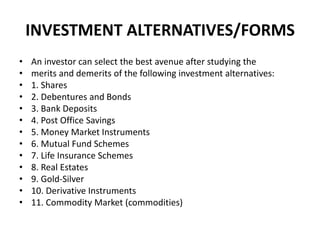Investment is defined as committing funds for a period of time in order to derive future payments that compensate for the time committed, expected inflation, and uncertainty. An investor has several investment alternatives including shares, bonds, bank deposits, mutual funds, life insurance, real estate, gold/silver, commodities, and derivatives. Shares represent ownership in a company and offer higher returns but also higher risk since prices fluctuate daily. Bonds are lower risk as they represent loans that pay fixed interest, but returns are also typically lower. Bank deposits provide liquidity but generally the lowest returns of the options.









































